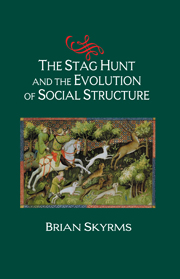4 - Evolution of Inference
Published online by Cambridge University Press: 05 June 2012
Summary
PHILOSOPHICAL SKEPTICISM
Jean-Jacques Rousseau begins his discussion of the origin of language in A Discourse on Inequality by toying with a paradox:
[A] substitution of voice for gesture can only have been made by common consent, something rather difficult to put into effect by men whose crude organs had not yet been exercised; something indeed, even more difficult to conceive of having happened in the first place, for such a unanimous agreement would need to be proposed, which means that speech seems to be absolutely necessary to establish the use of speech.
Rousseau moves on without taking the problem seriously, but the paradox echoes through modern philosophy of language. How can we explain the genesis of speech without presupposing speech, reference without presupposing reference, meaning without presupposing meaning? A version of this paradox forms the basis of Quine's attack on the logical empiricist doctrine that logic derives its warrant from conventions of meaning — that logical truths are true and logical inferences are valid by virtue of such conventions. Quine raised the general skeptical question of how conventions of language could be established without preexisting language, as well as calling attention to more specific skeptical circularities. If conventions of logic are set up by explicit definitions, or by axioms, must we not presuppose logic to unpack those conventions?
- Type
- Chapter
- Information
- The Stag Hunt and the Evolution of Social Structure , pp. 49 - 64Publisher: Cambridge University PressPrint publication year: 2003
- 1
- Cited by



